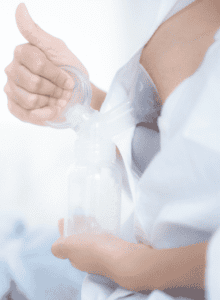To learn about different breast pumps, read the article Manual or Electric Breast Pump? Which One is Best?
 Is your baby breastfed full time and you want to give them three bottles or less per week? Have you noticed that they have a good sucking capacity and your milk production is excellent? In these circumstances, a good manual breast pump will be perfect to meet your needs.
Is your baby breastfed full time and you want to give them three bottles or less per week? Have you noticed that they have a good sucking capacity and your milk production is excellent? In these circumstances, a good manual breast pump will be perfect to meet your needs.
When you pump your milk, you have to do it at the right time. In fact, when a baby feeds from one breast, often the other will flow into the bra compress at the same time. Why not collect this milk? You can use the one-handed manual breast pump, a silicone recipient, a shield or buy a product in a specialised store designed for this purpose.
You can also pump the milk if the baby sleeps more extended periods at night. You wake up, and they are sleeping! They wake up after six or seven hours, and your breasts are engorged. Why not pump your milk before breastfeeding to disgorge? The baby will still get enough milk!
If the baby gets enough milk from one breast and doesn’t really feed on the second, why not pump a bit each time? It easy to build up milk reserves this way.
If the baby regularly breastfeeds and your milk production is satisfactory, but there is nothing left to pump after, you have to increase breast stimulation so that the production is higher than the baby’s needs. As you know, your breasts produce on demand, and the higher the demand, the higher the supply. To do this, you can pump your milk three times a day, 90 minutes after your baby breastfeeds. At the start, you won’t get much. You have to keep repeating the message to the brain to increase production. Over time, after a couple of days, the few drops will change into ounces of milk for storage. With this breast pump, the baby is responsible for maintaining milk production and needs to be breastfed full-time to make this possible.
The benefits of a manual breast pump:
The mother controls the suction power, so in principle, she should set her own pace based on her sensitivity. This model is also compact and easy to transport, clean and is practical for pumping several ounces when on outings away from home.
Maintenance
Whatever the type of breast pump, you always have to disinfect the parts before using it for the first time.
Because the breast pump is in direct contact with only breast milk, you should expect the presence of antibodies (white blood cells) contained in the milk to prevent bacterial infections. However, you need to clean the device daily. After each use:
- Rinse the parts with cold water to eliminate milk residues
- Then wash with soapy water
- Then rinse with the hottest tap water
- Cover and dry on the counter
Manufacturers often suggest disinfecting the breast pump once a day or several times a week using a microwaveable bag or in a steriliser. Don’t use the dishwasher because it can damage the rubber or silicone parts over time. Follow the manufacturer’s instructions for optimal use.
To read about electric breast pumps, go to Electric Breast Pumps.


